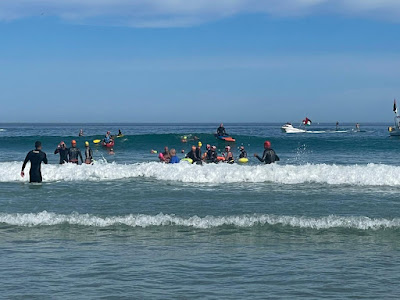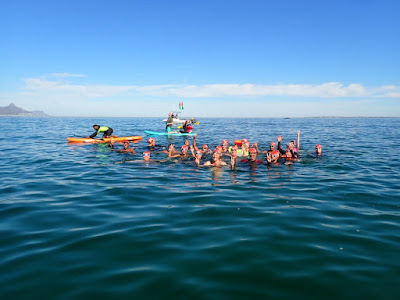On Freedom
Growing up mama used the expression 'ukuza kukaNxele' a lot. I won't attempt to translate it just yet but rather tell the story behind the expression. Mama used these words when she was exasperated by a long overdue promise that had been unfulfilled. Sometimes she used it to goad my sister and I for ukudukisa/promising to do something (usually our chores) but not delivering despite her chiding remarks. Her goading sometimes worked but it also led us to asking her one day ngubani uNxele? Kutheni angade afike? Who is this Nxele and why has he not arrived? Mama explained that Nxele-- whom we later learned was also Makanda kaNxele-- was a prisoner on Robben Island during the 19th century frontier wars of the Cape. He tried to escape imprisonment and died while swimming away from the island.
Mama's expression did three things for me as a child: mama was able to teach me something about history, she taught me about the nature of freedom (that others died in pursuit of it) and she gave me a moral code about doing something and fulfilling the task. I was a child under the age of 10 when mama was laying the foundation of these narratives. Lately I have been thinking about both uNxele and mama as both their lessons have been converging in my life this year in particular.
Let me begin with Nxele. Yesterday I participated in the Robben Island-Palestine Relay Swim; a fundraiser and campaign for the humanitarian relief for the people of Palestine. This was a collaboration between Gift of the Givers (to whom the proceeds have been channeled) and Palestine Solidarity Campaign. The swim was akin to the International Swim for Gaza which took place in other parts of the world in 2024. Yesterday was also Freedom Day in South Africa and the convergence of marking South Africa's freedom with the Palestinian plight needs little explanation here.
The swim was a vision which began as a conversation between two friends: Karen Daniels and Marion Stevens. When I met Marion in 2021, she was training for the Robben Island Crossing (an endurance swim from Robben Island to Blouberg Strand) which she completed in May 2022. The two friends conspired to merge the story of Robben Island as a symbol of incarceration and colonial violence with the fight for freedom by the Palestinian people. Their conversations, meetings, strategising and many hours of labour culminated in yesterday's Robben Island Relay taking place on Freedom Day. When Marion asked me to join the team of swimmers it was a no brainer despite my anxieties. My mind immediately took me back to mama's stories about Nxele escaping Robben Island in pursuit of freedom.
For most of my life I only knew about Nxele and the political prisoners of the liberation movement such as Neville Alexander, Robert Sobukwe and the more famous prisoners Nelson Mandela, Ahmad Kathrada and Walter Sisulu amongst many others. In the past five years I learned about Katye and Nonesi: two black women who spent time on Robben Island while their husbands, Maqoma and Siyolo (respectively) were imprisoned on the island. I came to this story thanks to Stephanie Victor's research on the women in her paper "‘Women in Captivity: Nonesi and Katye, the Wives of Xhosa Chiefs" published in 2014. When I decided to add their story to my teaching I came up against the reality that my students had not known about them either.
When an opportunity came about to write about epistemic justice in the the higher education curriculum my mind latched onto onto Katye, Nonesi and Emma Sandile. I wanted to reflect on three women who had walked the streets of Cape Town in the 19th century. I used the writing project to reflect on the experience of teaching their stories but also confronting epistemic injustice of historical narratives being sidelined and erased. What the consequences of half stories and erasures in relation to the grand narrative of Robben Island?
While writing the paper (titled Invoking names: finding black women's narratives in the classroom) I decided to visit Zonnebloem College where Emma Sandile had been a student. There was no plaque with her name nor the names of the early students who were the children of chiefs and kings embroiled in the Cape Colony's drama and collusion with the Anglican church. Zonnebloem College was created with the purpose of inculcating a British identity amongst the young African royals while their parents were fighting and strategising against colonial conquest in the 19th century. While I could rely on Janet Hodgeson's writing on Emma Sandile, I wondered about the everyday remnants of her story in the institution where she had been a historic presence. There were none I noticed on the day I visited the school.
I visited Robben Island with the same curiosity in relation to Katye and Nonesi even though I already had a sense of what I would find. While on the ferry to the island there was a video playing erratically which told a longer story about political prisoners who had been on the island; a story which did not begin with the liberation movement. I learned that the first political prisoners were indigenous people: Autshumato, Jan Cou and Boubo as far back as 1658. I learned about Tuan Guru who was imprisoned on the island with Callie Abdol Rauf, Badroedin [Badr al Dinj] and Noro Iman in 1780. While the video was static, I saw some of the images of the Xhosa chiefs and kings on the island as well as the women I was searching for. By the time I arrived on the island for the tour I was deeply disturbed by the gaps in my own knowledge about the island even though it had occupied a central theme in the story of South Africa's liberation. By the time the tour took us past the Kramat on the island and I learned about Sheik Madura who had died on the island in 1754, I was hollowed out. The rest of the tour was mournful and I haven’t returned to the island since. It felt as though I had walked through time and my world had expanded into more questions than answers.
I finished writing the chapter and left behind the story of
Robben Island which felt too complex me to fathom. Until Marion asked me to
join the Robben Island Relay Swim for Palestine. Even though I only swam about a
mile in the relay, the experience of the cold water the fleeing political
prisoners would have had to face when they attempted an escape was visceral. A
week before the relay we had trained in Blouberg and we found ourselves in a washing
machine in the ocean. Thankfully, yesterday was calmer with predictable swells
even though the temperature was icy!
There are many stories which are being uncovered about
political prisoners on the island. Recently I listened to a podcast produced by
Catherine Boulle about the
choir on the island which sang Handel’s Hallelujah. While we know about the
book culture on the island, we know very little about “the incongruous beauty
of the choir’s performance – and the rich history of the Messiah in South
Africa – is brought to life by former political prisoners, by musicians and
academics who reveal the power of music as it was experienced on the Island –
music as escape, protest, refuge and salvation.”.
After the swim I shared with a swimming friend (she’s the
reason I swam my first Midmar Mile earlier this year) that I’m ready for my
solo Robben Island Crossing. I have been contemplating it since Marion told me
about it. When Portia
Mokoena became the first black woman to swim the Robben Island crossing, followed by Banele
Lukhele, the historical weight of the swim eased for me (the historical and political implications of this need their own post). Open Water Swimming
has enough historical, economic and political burdens as it is. Swimming the short
distance yesterday while part of a team for a cause lifted some of that burden.
Knowing that I am in community with many swimmers who understand the political
and historical significance of freedom and swimming has changed my relationship
with even the idea of training for an endurance swim.
There are many threads to hold in this reflection but I want
to return where I began: ukuza kukaNxele and mama’s history lessons. Mama also
taught me about Tiyo
Soga’s life story and the hymns he penned which we sang at church. She told
me about the prophet Ntsikana
when I asked her why we never sang his hymn even though there was a version of
it in the hymn book. She taught me about Nongqawuse and many stories captured
in the idioms she used (my favourite remains: inkomo yenqoma yintsengibheka!).
All these stories were never part of my curriculum at school.
It is no wonder then that I find myself in a position where
I write and teach histories. I credit my interest in history to mama’s
foundational curriculum. Lately I have been in conversations about the ways in
which children’s historical consciousness can be developed beyond the school
curriculum. Xolisa Guzula and I have written our fourth history book for young
readers titled Together
Apart: The story of living in apartheid. Yesterday before setting off
to Blouberg for the swim, Xolisa and I had an interview with Sara-Jayne Makwala King on Cape
Talk. One of the questions she asked which has been coming up in the
launches we’ve had thus far: how do we explain a gruesome past to young children?
While I have been mostly telling the story about my niece asking questions
about inequality which can be explained through history, I should be telling people
about how mama managed to raise me with a historical consciousness that was age
appropriate throughout my childhood.
To be fair mama was a primary school teacher once upon a
time and I imagine she used that sensibility in how she raised us together with experiences from her own childhood which was influenced by her grandfather's stories: everything
and anything could be a teachable moment. If I asked her why she wore make up
she would respond with a lesson about imbola/ochre and its significance amongst
amaXhosa. This later turned into a lesson about amaqaba namagqobhoka and the
saga of African modernity in the 19th century which I read about
anew in Noni
Jabavu’s The Ochre People. When I look back on my childhood, it
seems mama couldn’t wait to talk about history, she was just waiting for a captive
audience.
The experience of writing histories in this moment, as well
as my involvement in campaigns such as a campaign raising money for people in
Gaza feels like time and place travel. Writing about the past in the present is
imaginative, creative and an archival challenge which continues to enthrall me.
Through swimming I am able to space travel and yesterday I travelled to Gaza
through the stories I have held in my heart: stories of heartbreak and of hope.
This is what freedom means to me in this moment: space and time travel and the
ability to connect multiple narratives in order to make better sense of myself
and the world.




Comments